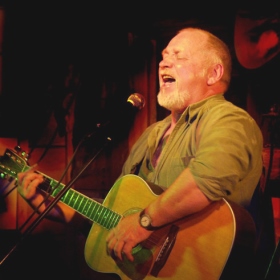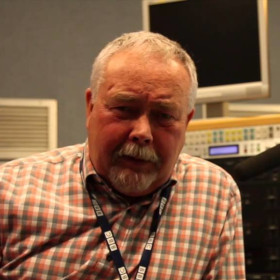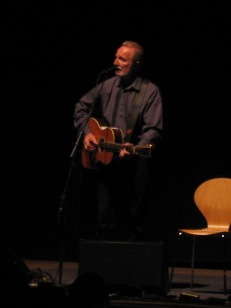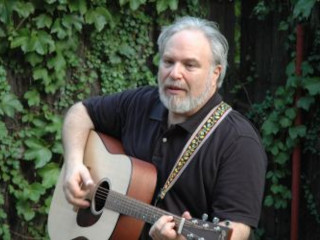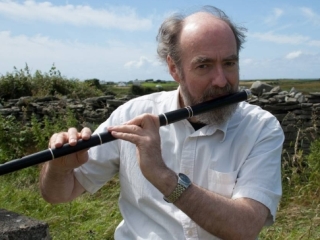FolkWorld #78 07/2022
Dai Woosnam's DAI-SSECTING THE SONG
No Man’s Land - by Eric Bogle
Before I tell you about the song I have selected as the thirteenth one to go under the Dai Woosnam microscope, let me preface this article with what has now become part of the wallpaper in this series: if you like, see the following four bullet points below as being akin to the “small print” in this contract between you the reader, and me the writer. Here goes...
It is a given that I might be talking total balderdash. After all, I have no monopoly on the truth. And even when my insights are proven correct, that does not stop you dear reader, from finding your own views to be totally antithetical to mine. But here is my news for you... we can both be right.
As Bob Dylan famously wrote “You’re right from your side/I’m right from mine”. And (much less famously) exclaimed in a press conference on his first full tour of the UK, when asked the meaning of a particular song... “My songs mean what they mean to YOU... man!”.
So don’t please write in vituperative language to the Editor to tell him that Dai is, to use the familiar English phrase, “barking up the wrong tree”. I might well be. And certainly every line of my views here are not endorsed by the Editorial Board of FolkWorld. Nor should they be.
Why have they hired me? Not sure. But my dear wife Larissa suggests it’s perhaps because they like the sound of my barking. I must say, I cannot top that conclusion...so I will end my preamble here, and get down to business.
Having gone to the USA for my first, second, fourth, fifth and eighth choices, and Ireland for my third, Scotland for my sixth, England for my seventh, ninth, tenth and twelfth, and Canada for my eleventh, I choose to make my first visit to Australia with my thirteenth.
It is the only song of Eric Bogle’s that can match his signature song And The Band Played Waltzing Matilda for worldwide fame. And as I have already published a long article on that veritable ‘gold medal’ of a song, I am deliberately choosing to write on Eric’s ‘silver medal’ song here... as it would be an easy temptation for me to rehash my already published words on ‘Matilda’.
So here goes my take on this song that resulted from Eric’s visit to Northern France and Flanders in 1976, to see the graves of those lads who died so staggeringly young. He was back in Scotland at the time visiting his folks, who he had not seen since emigrating to Oz in 1969. So it was a short hop to the First World War battlefields, which as the crow flies, are nearer to the Kent coast, than Dover is to London...!!
Let’s look at the song lyrics:
No Man's Land
(Eric Bogle)
Well how do you do Private Willie McBride
Do you mind if I sit here down by your graveside
And I’ll rest for a while in the warm summer sun
Been walking all day Lord and I'm nearly done
And I see by your gravestone you were only 19
When you joined the Glorious Fallen in 1916
I hope you died quick and I hope you died clean
Or Willie McBride, was it slow and obscene
Chorus :
Did they beat the drum slowly, did they sound the fife lowly
Did the rifles fire o’er ye as they lowered you down
Did the bugles sing the Last Post in chorus
Did the pipes play the 'Flooers o' the Forest'
And did you leave a wife or a sweetheart behind
In some faithful heart is your memory enshrined
And though you died back in 1916
To that loyal heart are you forever 19
Or are you a stranger without even a name
Forever enshrined behind some glass pane
In an old photograph torn and tattered and stained
And fading to yellow in a brown leather frame.
Chorus :
Did they beat the drum slowly, did they sound the fife lowly
Did the rifles fire o’er ye as they lowered you down
Did the bugles sing the Last Post in chorus
Did the pipes play the 'Flooers o' the Forest'
The sun's shining down on these green fields of France
The warm wind blows gently and the red poppies dance
The trenches have vanished long under the plough
No gas and no barbed wire no guns firing now
But here in this graveyard it's still No Man's Land
The countless white crosses in mute witness stand
To man's blind indifference to his fellow man
And a whole generation who were butchered and damned
Chorus :
Did they beat the drum slowly, did they sound the fife lowly
Did the rifles fire o’er ye as they lowered you down
Did the bugles sing the Last Post in chorus
Did the pipes play the 'Flooers o' the Forest'
And I can't help but wonder now Willie McBride
Do all those who lie here know why they died
Did you really believe them when they told you 'The Cause'
Did you really believe that this war would end wars
Well the suffering the sorrow the glory the shame
The killing the dying it was all done in vain
For Willie McBride it’s all happened again
And again and again and again and again
Chorus :
Did they beat the drum slowly did they sound the fife lowly
Did the rifles fire o’er ye as they lowered you down
Did the bugles sing the Last Post in chorus
Did the pipes play the 'Flooers o' the Forest'
Did the bugles sing the Last Post in chorus
And did the pipes play the 'Flooers o' the Forest'
A wonderfully clear set of lyrics, that really need no explaining from me. I have never quite understood bugles ‘singing’, but hey, I am happy figuring that it must be the verb they use in the military.
The saddest thing about this song is that it was allegedly a favourite song of that warmonger Tony Blair. (Talk about a sick joke...?)
Pedants who are looking for mistakes in a song lyric, will find no fertile ground here... unlike his Matilda song, where he has long openly confessed to two errors (ANZAC soldiers did not have ‘tin hats’ but forage caps; and Anzac Cove - and not Suvla Bay- was where they disembarked.)
Amusingly, Eric tells of a phone-in radio show, where he was the studio guest. And some pompous twit takes him to task saying “I’ve found two glaring errors”. Quick as a flash Eric responded with “You are wrong: there are three. Ring back when you have found the third!”
Collapse of stout party.
And Eric with a twinkle in his eye adds “there wasn’t a third, but it did the job and sufficiently bamboozled and deflated my pompous wise-guy critic!” Brilliant.
But back to mistake-free No Man’s Land (well the question of Willie McBride’s sheer existence and grave apart... see below)... let us now play the song. I won’t start with the first version I ever heard – by June Tabor – although I like it well enough.
Instead, let us play what is clearly the definitive version on YouTube: Eric himself on vocals, his great pal the late John Munro to his left, and to Eric’s immediate right, superb fiddler Emma Woolcock (or Emma Luker as I used to know her as), and to her right, is Pete Titchener, a long time vital cog in the Bogle machine.
And this next clip is Eric's favourite version of the myriad covers there have been of this great song: it is by Scots-Canadian John McDermott, a very fine MOR singer. There is a good use of subtitles, but bad use of (wrong) song title. Eric never sanctioned this alternative title.
And here is the first part of a short documentary when Eric in his 75th year returns to the battlefield and reflects on the song. It is fascinating that he admits that he chose the name Willie McBride because it rhymed with 'down by your graveside'. That made me smile, but also reflect on his bigger point that there was somebody's 'Willie McBride' in all the graves. (My own uncle – my dad’s big brother - is in one of those cemeteries, killed at the Battle of Ypres, aged just 19). Eric is also saying that in a way, Willie even gives his name to every one of the Unknown Soldiers too.
I find this documentary engrossing, and particularly moving when Eric speaks his song's lyrics.
(Interesting that as he has got older, his Scots brogue has come to the fore again. I think that in old age, reverting to one's childhood accent is true of many people. When he first became famous in the late 1970s, the fact that he had moved home to the other far corner of the world, seemed to influence his diction and give him a curious one-off accent of his own.)
This song has been covered by a myriad performers, including several versions in foreign languages. Two of the latter that jump out at me, is first, this one in the Welsh language of my native country:
It sees grey haired, goatee bearded, Frank Hennessy, a veteran folk singer, and a born and bred Cardiffian. He was a monoglot English speaker into advanced middle age, when – as the basis for a radio series on BBC Wales - he embarked on a successful experience learning to speak Welsh. I have always loved the DNA of Frank’s voice: it speaks to me the more here, even if I can see it is not technically as good as the voice of the native Welsh speaker, Blaenau Ffestiniog born Rhys Meirion, alongside him. Rhys is, after all, an acclaimed opera singer.
Gwaed Ar Eu Dwylo
[Verse 1]
O Tomos John Williams, mi welaf dy fedd
Ar gaeau glas Ffrainc sydd heddiw mewn hedd.
'Rwyt heddyw mor unig, mor bell o Fron Goch
A'r pabi yn unig sy'n cofio'r gwaed coch.
Mi welaf nad oeddyt ddim ond deunaw oed
Wrth ddisgyn i'r Somme - dyna'r hanes erioed;
Wrth ymladd dros wledydd a thros eu rhyddhau
Mi gefaist yn ddeunaw i'r ddaear dy gau.
[Chorus 1]
Ond ni che'st d'alw'n arwr, na dy gyfri'n wladgarwr,
Ac ni chwifiwyd y baner ar hanner y mast,
Ac ni wnaed uwch dy waed unrhyw wylo
Gan y rhai oedd a gwaed ar eu dwylo.
[Verse 2]
A phwy oeddan nhw ddwedodd wrthyt ysgwn
Mai swanc oedd o lanc ysgwyddo y gwn;
A phwy oeddan nhw efo'u hiwnifform swel
A'th ddriliodd, a'th fartsiodd, a'th fwrdrodd mewn sbel?
Ni welais drwy hyn tan rhy hwyr yn y dydd
Ni che'st ti mo'r cyfle i dyfu'n ddyn rhydd,
Ond drwy'r mwg a thrwy'r medals wrth ddisgyn i'r llawr
Mi welaist nad nhw fyddai'n wylo yn awr.
[Chorus 2]
Ond ni che'st d'alw'n arwr, na dy gyfri'n wladgarwr,
Ac ni chwifiwyd y baner ar hanner y mast,
Ac ni wnaed uwch dy waed unrhyw wylo
Gan y rhai oedd a gwaed ar eu dwylo.
{Verse 3]
'Roedd eraill mewn cell yn dy annwyl Fron Goch
Yn llwydaidd eu gwedd, yn cael bwyd cibau'r moch,
Ond fflam eu gwrthryfel a gadwant ynghyn,
A Werddon a gododd drwy safiad di-gryn.
Mi gawsant gaethiwed am geisio rhyddhau
Eu gwlad hwy o'r dwylo a'th yrrodd i'th wae,
A mam yn Mron Goch oedd a'i chalon yn drom
Wrth glywed fod llencyn yn llwch yn y Somme.
[Chorus 3]
Ond ni che'st d'alw'n arwr, na dy gyfri'n wladgarwr,
Ac ni chwifiwyd y baner ar hanner y mast,
Ac ni wnaed uwch dy waed unrhyw wylo
Gan y rhai oedd a gwaed ar eu dwylo.
[Verse 4]
Mae dynion yn Llundain o'u seddau'n Whitehall
Yn gyrru i ryfel rhai byth na ddon 'nol,
O slymiau tre Glasgow, neu Gymru cefngwlad
Mae hogyn diniwed yn crychu y gad -
I farw neu ynteu i ladd ei gyd-ddyn,
Yn enw rhyw ryddid nas gwyr ei hun,
'Rwyt ti Tomos Williams ddim yn y byd
Yn disgyn yn 'sglyfaeth i'r ffosydd o hyd.
[Chorus 4]
Ond ni che'st d'alw'n arwr, na dy gyfri'n wladgarwr,
Ac ni chwifiwyd y baner ar hanner y mast,
Ac ni wnaed uwch dy waed unrhyw wylo
Gan y rhai oedd a gwaed ar eu dwylo,
Gan y rhai oedd a gwaed ar eu dwylo.
And this one in the national language of my host publisher here: sung by Hannes Wader (1980). I cherish the passion here: nothing remotely false about it.
I am no polyglot, but I can see by using Google Translate that both versions in translation, tweak Eric’s lyrics more than somewhat (!): but hey, no matter, the anti-war sentiment still comes ringing through.
Here is the German lyric...
Es ist an der Zeit
Weit in der Champagne im Mittsommergrün,
dort, wo zwischen Grabkreuzen Mohnblumen blühn,
da flüstern die Gräser und wiegen sich leicht
im Wind, der sanft über das Gräberfeld streicht.
Auf deinem Kreuz finde ich, toter Soldat,
deinen Namen nicht, nur Ziffern, und jemand hat
die Zahl neunzehnhundertundsechzehn gemalt,
und du warst nicht einmal neunzehn Jahre'alt.
Ja, auch dich haben sie schon genauso belogen,
so wie sie es mit uns heute immer noch tun.
Und du hast ihnen alles gegeben - deine Kraft, deine Jugend, dein Leben.
Hast du, toter Soldat, mal ein Mädchen geliebt?
Sicher nicht, denn nur dort, wo es Frieden gibt,
können Zärtlichkeit und Vertrauen gedeihn.
Warst Soldat, um zu sterben, nicht um jung zu sein.
Vielleicht dachtest du dir, ich falle schon bald,
nehme mir mein Vergnügen, wie es kommt, mit Gewalt.
Dazu warst du entschlossen, hast dich aber dann
vor dir selber geschämt und es doch nie getan.
Ja, auch dich haben sie schon genauso belogen,
so wie sie es mit uns heute immer noch tun.
Und du hast ihnen alles gegeben - deine Kraft, deine Jugend, dein Leben.
Soldat, gingst du gläubig und gern in den Tod?
Oder hast du, verzweifelt, verbittert, verroht,
deinen wirklichen Feind nicht erkannt bis zum Schluß?
Ich hoffe, es traf dich ein sauberer Schuß.
Oder hat ein Geschoß dir die Glieder zerfetzt?
Hast du nach deiner Mutter geschrien bis zuletzt,
bist du auf deinen Beinstümpfen weitergerannt,
und dein Grab, birgt es mehr als ein Bein, eine Hand?
Ja, auch dich haben sie schon genauso belogen,
so wie sie es mit uns heute immer noch tun.
Und du hast ihnen alles gegeben - deine Kraft, deine Jugend, dein Leben.
Es blieb nur das Kreuz als einzige Spur
von deinem Leben, doch hör meinen Schwur,
für den Frieden zu kämpfen und wachsam zu sein.
Fällt die Menschheit noch einmal auf Lügen herein,
dann kann es geschehn, daß bald niemand mehr lebt,
niemand, der die Milliarden von Toten begräbt.
Doch längst finden sich mehr und mehr Menschen bereit,
diesen Krieg zu verhindern, es ist an der Zeit.
Ja, auch dich haben sie schon genauso belogen,
so wie sie es mit uns heute immer noch tun.
Und du hast ihnen alles gegeben - deine Kraft, deine Jugend, dein Leben.
Ja, auch dich haben sie schon genauso belogen,
so wie sie es mit uns heute immer noch tun.
Und du hast ihnen alles gegeben - deine Kraft, deine Jugend, dein Leben.
And of many spin-off re-workings, I like this by Stephen Suffett.
This is the reply that Willie McBride gives to Eric Bogle...
My dear friend Eric, this is Willie McBride,
Today I speak to you across the divide,
Of years and of distance of life and of death,
Please let me speak freely with my silent breath.
You might think me crazy, you might think me daft,
I could have stayed back in Erin, where there wasn't a draft,
But my parents they raised me to tell right from wrong,
So today I shall answer what you asked in your song.
Yes, they beat the drum slowly, they played the pipes lowly,
And the rifles fired o'er me as they lowered me down,
The band played "The Last Post" in chorus,
And the pipes played "The Flowers of the Forest."
Ask the people of Belgium or Alsace-Lorraine,
If my life was wasted, if I died in vain.
I think they will tell you when all's said and done,
They welcomed this boy with his tin hat and gun.
And call it ironic that I was cut down,
While in Dublin my kinfolk were fighting the Crown.
But in Dublin or Flanders the cause was the same:
To resist the oppressor, whatever his name.
Yes, they beat the drum slowly...,,,.
It wasn't for King or for England I died,
It wasn't for glory or the Empire's pride.
The reason I went was both simple and clear:
To stand up for freedom did I volunteer.
It's easy for you to look back and sigh,
And pity the youth of those days long gone by,
For us who were there, we knew why we died,
And I'd do it again, says Willie McBride.
But let me leave you with not so much a re-working, as a truly glorious parody, from the pen of Belfast’s Crawford Howard (adapted by Fintan Vallely).
Not Willie McBride
Have you heard of that song about Willie McBride?
If I hear it again, it'll turn me insides,
For it's sung in the springtime and sung in the fall,
But mostly by people who shouldn't sing at all.
You go down to the pub on a Saturday night
For a pint and a song and things are all right,
Till some drunken punter comes up by your side
Saying, 'Shing ush that shong about Willie McBride.'
Well, you say you don't know it but that will not do,
For now he's determined to sing it to you.
Then he spills half your drink and starts off in a key
That was never invented on land or on sea.
And as time goes on, sure the whole thing gets worse,
For you now realise that he knows every verse.
With his arm round your shoulder, 'cos now he's your friend,
He's determined to sing the damned thing to the end.
Did they sing the song badly? Did they sink their pints gladly?
Did the drunks fall asleep as they lowered them down?
Did the barmen shout 'Last drinks!' in chorus,
And did the punters say 'Thank Christ it's over'?
Well you go to the loo for a quarter of an hour
And you watch the TV in the old public bar.
Then you come back, thinking that he must tire,
But he's still going on about gas and barbed wire.
Then ten minutes later, you're still in a trance
While he's up to his armpits in the green fields of France.
The punters are quiet. You'll not hear a peep,
For now you realise that they've all gone to sleep.
Now listen, McBride, what the hell is your game
With that photograph stuck in a mouldy old frame?
You can buy them at Smithfield for ten pence a throw,
So what's all the fuss about, I'd like to know?
And what's all the fuss about barbed wire and smoke?
Sure, you shouldn't have joined if you can't take a joke!
And who gives a toss where the red poppies dance?
O Willie McBride, won't you give us a chance?
O Willie McBride, why the hell did you die?
The trouble you'd saved had you come back alive,
And got a good job or signed on the brew*,
So we'd not have to listen to songs about you!
Now it's the last verse, and I'm glad that you're dead,
With the green fields of France piled up over your head,
For the trouble you've caused since the day that you died,
Oh, shooting's too good for you, Willie McBride.
* Crawford Howard's native Belfast slang for 'on the dole'.
That parody is wickedly accurate. I for one, broke the habit of a lifetime, and kept away from folk clubs for several years, partly because this song became madly popular amongst floor singers who were (myself alas included!) not up to the task of delivering it in any way that did it justice. It began to wear me down. Only when its huge popularity started to subside, did I find the necessary desire to go back into the clubs.
But gee, joking aside, it remains a magnificent song. One that I can safely predict will be sung a hundred years from now.
Dai Woosnam, Grimsby... 24/04/2022
dai.woosnam@folkworld.eu
Photo Credits:
(1) Dai Woosnam,
(2) Eric Bogle,
(3) Frank Hennessy,
(5) Steve Suffet,
(6) Fintan Vallely,
(7)-(8) Sina Theil
(unknown/website);
(4) Hannes Wader,
(by Walkin' Tom).
FolkWorld - Home of European Music
 Layout & Idea of FolkWorld © The Mollis - Editors of FolkWorld
Layout & Idea of FolkWorld © The Mollis - Editors of FolkWorld
